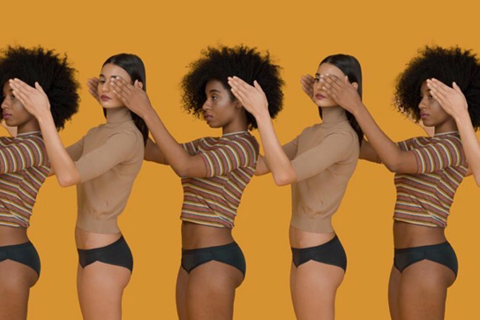Women and Mental Health
thinx archive
·5 min read

by Team Thinx | 08/24/2016
WHEN YOUR MIND GOES BLANK: How We Cope With Anxiety
When we interviewed olympic gold medalist boxer Claressa Shields a few months back, I asked her how she’s able to respond to her opponents swings so quickly, all while taking her own punch. Shields is not necessarily the biggest boxer, but she reacts to her opponents at lightning speed. “My mind goes blank,” she told me “but my body has prepared so many times it doesn’t need to think about it. It’s 5 steps ahead of the match, every time.”
I thought about Shields response later as I walked home, and realized how it reminded me of my everyday life. I don’t need to consciously think about what I would do if I was attacked or harassed on the street, but my body is in a constant state of alert, ready to spring into action at a moment's notice. My legs are aware of the man walking behind me and stretch, even if he’s father back, and I cross the street without hesitation to walk on the sidewalk that is better lit. If it’s dark out, I instinctively take out my earbuds before leaving the train, and always secure my front door shut behind me so no one can follow me in. After lots of practice, I too have conditioned myself to prepare for a swing, from no matter what direction, without having to think about it. I live in a constant state of anxiety, while also being an auto-pilot.
The Anxiety and Depression Association of America has reported that from the time a girl reaches puberty until about the age of 50, she is twice as likely to have an anxiety disorder as a man, and I often wonder if this is because women have to suppress even the smallest of anxieties just to walk down the street. When 1 out of 4 women are victims of sexual abuse, how are we supposed to stay calm and anxiety-free when a train unexpectedly halts underground and it’s just you and a larger man in the cart? Or when your Uber driver goes in the totally wrong direction and doesn’t ask for clarification? How are we supposed to tell ourselves that it’s “all in our head” when the numbers are stacked against us? I’m always struggling to find a line between cautious and paranoid, or careful and overdramatic. Which one is it?
Shields may be able to keep her mind blank, but that doesn’t come without an urgency, a hunger, to succeed and survive. We keep our minds blank because we’ve gone through the same motions so many times before that perhaps it's not just instinctual. Maybe if we think about how badly we want to get through it on top, unscathed, the anxiety is too much to bear.
HEALTH RISKS FOR WOMEN IN THE CITY
Being a woman in the city* leads to many potential health risks: food poisoning from corner-store sushi, getting hit by a rogue biker, MICE. Cities are basically death traps. But what about health risks that are less physical? Studies have proven that women are twice as likely to have anxiety disorder than men, but, like, half as likely to report their feelings to their doctors. I’m no math whiz, but those numbers don’t seem to add up. Part of this reasoning is due to the many ways women are taught to downplay or distrust their emotions, writing them off hysterics, drama, attention-seeking, etc. According to OB/GYN, NP Marcelle Pick, “most psychologists look at anxiety as purely emotional: the outward sign of repressed negative feelings and inner conflict. But over 30 years of scientific research into severe anxiety disorders and panic attacks has established that all anxiety has a real, physiological cause that is just as important to treat.” She also makes the point that it is often “the high-achieving, seemingly ‘together’ woman who finds it difficult to admit she has chronic anxiety”; something we feel is particularly relatable to women who work and live in an urban setting. The pressure of maintaining an image or lifestyle in the face of constant stresses can be exhausting and damaging to our mental health. So yeah, women are twice as likely to have anxiety or depression because science. But also because culture. Here’s a look at both.
***BUT as we all know, all women are different and there is no one way to experience life as a lady in a city. So do what feels right for you.
First, let’s look at some of the symptoms of anxiety, taken from Women’s Health Mag.
Feeling restless or keyed up
Having tense muscles
Having difficulty concentrating or remembering (your mind goes blank)
Having trouble falling asleep or staying asleep, or not feeling rested after sleep
Avoiding activities that could turn out badly (avoiding even small risks)
Spending excessive effort preparing for events that could have a negative outcome
Procrastinating or having trouble making decisions
Worrying that leads to repeatedly asking for reassurance
And here are some of the types of anxiety disorders that exist.
Women are twice as likely to have all anxiety disorders aside from PTSD, but especially Generalized Anxiety Disorder; however, there are many other kinds of disorders, too. Here's a list of 'em:
General anxiety disorder (GAD)
Panic disorder
Social anxiety disorder
Major depressive disorder
Phobic disorders
Obsessive-compulsive disorder (OCD)
Post-traumatic stress disorder (PTSD)
Separation anxiety disorder
Now that we're more familiar with the different faces anxiety can take, let's look at the different ways anxiety uniquely affects women and menstruating people, biologically:
PMS:
Though it has a history of portrayal in popular media as an immature or trivial condition, PMS-ing isn’t just irrational mood-swings and irritability; it’s also anxiety. There isn’t a ton of readily available research done about PMS other than how it can cause acne, bloating, cramps, and bitchiness (CC: Katy Perry circa 2008). Usually way at the bottom of every symptoms list, buried beneath the more aesthetic responses, you’ll find the words “anxiety/depression.” These issues result partially from hormonal increases and “changes to the body’s stasis” as this site describes; specifically stress hormones such as cortisol. The spike in the stress hormone, triggered usually one or two weeks before bleeding starts, can amplify the stress and anxiety experienced by a woman all month long. Cortisol is a hormone that, outside of menstruation, is typically released in times of danger, fear, or even heightened competition. Awww, look at our bodies tryna communicate.
MENOPAUSE AND POSTPARTUM: When the few people who do speak about postpartum anything actually speak, postpartum depression is usually their tune. Anxiety, experienced both during and after pregnancy, is often left out of the conversation, though it can be just as debilitating and frightening for mothers. Believe it or not, some moms are only human and are easily overwhelmed by the idea of taking care of another human life for the rest of theirs. Weird! #NotAllMoms
ESTROGEN/SEROTONIN/GUT: The gastrointestinal tract is a major indicator of anxiety, in that many anxiety symptoms present themselves through gastrointestinal processes. (Nervous diarrhea, party of one.) And as much as nausea, bloating, and IBS are often bodily reactions to anxiety, there are a host of ways that our anxiety reacts to our guts. Taking care of your gut--AKA eating well and getting enough sleep--can help improve your mood on a hormonal level, some studies show. When there’s an overpopulation of bad bacteria in our intestines, certain mood-enhancing hormones are compromised, like serotonin and dopamine, which can apparently be produced in the gut. TBH, I’m as surprised as you right now. The discovery that hormones are created not only in the brain but also in the stomach is relatively new and somewhat controversial, but we learned about it from this website run by Marcelle Pick, an OB/GYN, NP of Boston College-Harvard Medical School, who seems pretty legit. Basically, a healthy diet full of fresh fruits and vegetables, and essential fats like Omega-3s (found in salmon, walnuts, avocado, etc.) are connected to mood management. Of course, we know that not all Whole Foods patrons are happy, but physically having access to a healthy diet will protect your gut and potentially your mental health. Ya got guts, kid.
According to this .gov fact sheet about anxiety, “changes in levels of the hormone estrogen throughout a woman's menstrual cycle and reproductive life (during the years a woman can have a baby) probably play a role” in the reasons why women are twice as likely to have anxiety disorder than men.
So doctors and scientists talk a lot about the biological explanations for high rates of anxiety in women. And while that research is important, we can’t help but feel like there’s something else here that we’re missing. What about when…….
A strange man traces your legs with his beady eyes as you walk past?
On your way to work, the sidewalk transforms into a runway against your will because there are construction workers lining the pavement and watching your every movement?
A strange man refuses to leave you alone on the train?
A strange man “compliments” you with sexual harassment and public shaming on the street?
You have to reroute your walk home because you fear for your safety?
You read another article about an apartment break-in or act of sexual/gendered violence?
You’re stressed about being on the look-out for other women?
You’re afraid to take public transportation late at night?
But you’re also afraid to walk?
And you’re also afraid of your uber or cab driver?
A strange man touches you on the subway?
A strange man stalks a woman onto the subway and verbally harasses her and no one around says anything but you?
Is anxiety in women really twice as common simply because of our ~hormones~? Or is our environment equally as responsible for the elevated rates of anxiety disorders in women? Long story short: if you’re feeling anxious living as a woman in a big city, you’re not crazy. Not only are women generally twice as likely to experience anxiety as men (and half as likely to report symptoms to a doctor), life in a city factors in even more reasons to experience anxiety and fear in public We’ll leave you with that thought.
by Team Thinx


